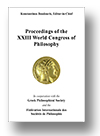|
1.
|
Proceedings of the XXIII World Congress of Philosophy:
Volume >
18
Hernán Matzkevich
From Leon Hebreo to Abraham Cohen de Herrera:
Their Syncretism, Assimilation and Influence in Western Philosophy
abstract |
view |
rights & permissions
| cited by
In this proposal I would like to present figures and works such as Leon Hebreo´s Dialoghi d´Amore and Abraham Cohen de Herrera´s Porta Coelorum as examples of the interrelation between Jewish and Christian scholars. This is a story that begins in 1492, when the Expulsion of the Jews from the kingdoms of Castile and Aragon took place. Alongside with the spread of Jewish people around the Maghreb, the Balkans, Palestine, the Netherlands, England and Italy this community started to have intellectual exchanges with the Christian population around them and this situation of course modified the cultural universe of both, Jewish and Christians. The fashion of Hebraism among Christian scholars during the sixteen and seventeen centuries had been place in part thanks to this kind of syncretism that could teach them the keystones of the Jewish intellectual framework but in an understandable way for their sensibility. The Jewish writings were because of that, one of the keystones in the foundation of modern science and philosophy, a source of inspiration for the systems and theories of space and matter of figures such as Conway, More or Newton.
|
|
|
2.
|
Proceedings of the XXIII World Congress of Philosophy:
Volume >
18
Xiaowei Fu, Yi Wang
The Idea of Immortal Life after Death in Biblical Judaism and Confucianism
abstract |
view |
rights & permissions
| cited by
There is no notion of postmortem Heaven and Hell in both ancient Israeli and Confucian traditions, and the two traditions also share quite a number of similarities about the idea of immortal life after death. Therefore, a comparison of the commonness in this field, e.g. the Jewish Levirate Marriage custom and the Confucian custom of adopting one’s son as heir; the idea of name surviving death in Biblical Judaism and that of glorifying one’s parents by making one’s name famous in future ages in Confucianism, can help us reveal the common pursuit in the two traditions: the postmortem fulfillment of an individual is realized in the form of the continuation of one’s family/ tribe/ nation of which they were, and forever remain, a generational link. In addition, this can help clarify a long faulted Confucian dogma of “Having no male heir being the gravest of the three cardinal offences against filial piety”.
|
|




